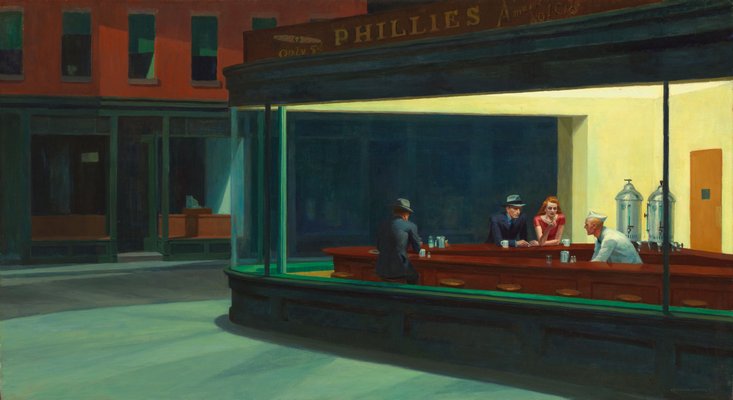
If you’re looking for the perfect gift for your spouse to celebrate your 50th anniversary, why don’t you commission a piece of music? That’s what Jane and Marvin Deckoff did. Ms. Deckoff is the president of Quogue Chamber Music, Inc., and the commissioned work, Trio for oboe, bassoon, and piano, “Hopper Nocturnes,” by Chicago composer Dan Visconti, received its world premiere Saturday at Quogue Community Hall. The occasion was the first concert of the season of Quogue Chamber Music.
The seven nocturnes, or night pieces, are inspired by paintings of the great American artist, Edward Hopper, whose canvases convey an almost desolating loneliness, a sense that something is missing. In the composer’s words the nocturne is a “place of both ascetic repose and yearning unrest. Hopper’s lovers are defined by each other’s absence as much as union …” The paintings included the famous “Nighthawks,” “Automat,” and “Early Sunday Morning.” We heard jagged rhythms, elements of jazz and blues, an urban lyricism, stretches of neo-classicism, echoes of Bernstein, Copland, and Lukas Foss.
The test of a piece of contemporary music is “Do we want to hear it again?” To which the answer in this case is “yes.”
The performers for the evening were oboist Gerard Reuter, bassoonist Adrian Morejon, and pianist David Oei. Mr. Reuter and Mr. Morejon are members of the Dorian Wind Quintet, and Mr. Oei has had a distinguished career as a performer.
Mr. Visconti was in good company. The evening began with Haydn’s Trio in G Major, Hob. XV:25. Also called the “Gypsy,” because of the rollicking final rondo that draws heavily on the Gypsy music that Haydn certainly heard in the Esterhazy court. I must say that I prefer the original instrumentation of piano, violin and cello, but these are excellent musicians, who carry it off with panache. Bravos particularly go to Mr. Oei. This is a keyboard work, first and foremost, and he led with great sensitivity and elegance.
After a brief intermission Mr. Oei and Mr. Morejon returned with Saint Saëns Sonata for Bassoon and Piano. The work was written in the last year of Saint Saëns’ life and he never heard it performed.
It is a haunting and lyrical work and in Mr. Morejon’s traversal there was something warmly personal. It was, he said, the first piece he learned and was loved by his mother. The performance was beyond criticism, beautifully phrased and nuanced.
Mr. Reuter joined Mr. Oei for a performance of “Three Waltzes” by Stephen Sondheim, arranged by Sir Richard Rodney Bennett. The first, “Night Music,” and the third, “You Must Meet My Wife,” are from “A Little Night Music;” the second, “Barcelona,” is from “Company.” The performance gave this listener, never a fan, a new appreciation of the music of Sondheim. The scales fell from my eyes, or, in this case, from my ears. Mr. Reuter revealed in them a poetry that I never knew was there.
The final work of the evening was the Trio for Oboe, Bassoon, and Piano by Francis Poulenc. Except for a few lessons with Ravel and a few years of lessons on theory from Charles Koechlin, Poulenc was largely self-taught.
He sipped daintily from the most popular music of the moment: the music hall, the circus, and “Le Jazz Hot.” He began his career already identified as a member of the French group known as “Les Six,” which in addition to him was composed of the musicians Georges Auric, Arthur Honegger, Darius Milhaud, Germaine Tailleferre and Louis Durey.
The group thumbed its collective nose at the stuffed shirts of music. They saw themselves as an antithesis to the ponderous seriousness of the German romantics, chiefly Wagner. Poulenc was the most successful of the group and wrote music that was knowingly frivolous. Poulenc’s music is witty, urbane, intentionally naive and without complication. He had a gift for melody, a deceptive simplicity of expression, and a gift for the musical wisecrack. He once characterized himself as “part monk, part voyou,” a Parisian slang term meaning, more or less, a little street urchin.
The musical burden for most of the trio is borne by the piano, with the bassoon contributing its comments and asides, and the oboe going off on its own flights of lyrical fancy. The work ends with a madcap rondo, a modern equivalent of a gigue.
The performance throughout was seamless and thrilling. If one were deaf one could tell how good the performance was by the ebullience and good spirits of the audience as they emerged into the night.